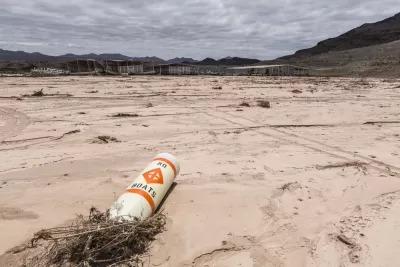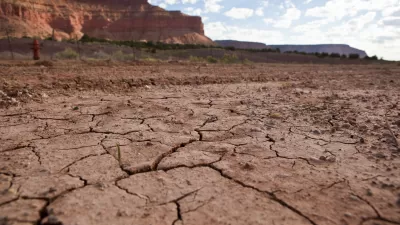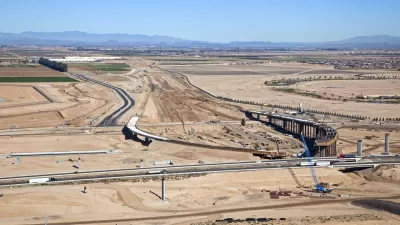A NOAA-led task force warns that the drought facing the western U.S. will continue well into 2022 or later without serious efforts to mitigate human-caused global warming.

As the years-long drought in the Southwest continues to intensify, Rebecca Lindsey writes that the "extremely high temperatures brought by human-caused global warming" combined with record-low precipitation to create devastating conditions–and that, without more aggressive interventions to control global warming, the current drought may just be "a preview of coming attractions." This is according to a new report from a National Oceanic and Atmospheric Administration (NOAA)-led task force, which found that "almost the entire western half of the contiguous United States" faced "some level of drought" by the end of August 2021, while temperatures for the prior months reached "near-record highs."
Exactly how devastating these conditions will be in different parts of the Southwest will depend on regional and seasonal variability in future precipitation as well as the decisions people make about how to manage the region’s scarce water resources. But the current drought suggests that the costs will be steep and the impacts far-reaching. The NOAA Drought Task Force estimated that the 2020 economic cost of drought in the Southwest was between $515 million and $1.3 billion—not including the costs associated with fires.
The task force warns that this year's winter precipitation will likely "be below average once again," dashing hopes for a break in the current drought.
FULL STORY: NOAA-led drought task force concludes current Southwest drought is a preview of coming attractions

Alabama: Trump Terminates Settlements for Black Communities Harmed By Raw Sewage
Trump deemed the landmark civil rights agreement “illegal DEI and environmental justice policy.”

Study: Maui’s Plan to Convert Vacation Rentals to Long-Term Housing Could Cause Nearly $1 Billion Economic Loss
The plan would reduce visitor accommodation by 25% resulting in 1,900 jobs lost.

Planetizen Federal Action Tracker
A weekly monitor of how Trump’s orders and actions are impacting planners and planning in America.

Wind Energy on the Rise Despite Federal Policy Reversal
The Trump administration is revoking federal support for renewable energy, but demand for new projects continues unabated.

Passengers Flock to Caltrain After Electrification
The new electric trains are running faster and more reliably, leading to strong ridership growth on the Bay Area rail system.

Texas Churches Rally Behind ‘Yes in God’s Back Yard’ Legislation
Religious leaders want the state to reduce zoning regulations to streamline leasing church-owned land to housing developers.
Urban Design for Planners 1: Software Tools
This six-course series explores essential urban design concepts using open source software and equips planners with the tools they need to participate fully in the urban design process.
Planning for Universal Design
Learn the tools for implementing Universal Design in planning regulations.
Caltrans
Smith Gee Studio
Institute for Housing and Urban Development Studies (IHS)
City of Grandview
Harvard GSD Executive Education
Toledo-Lucas County Plan Commissions
Salt Lake City
NYU Wagner Graduate School of Public Service





























